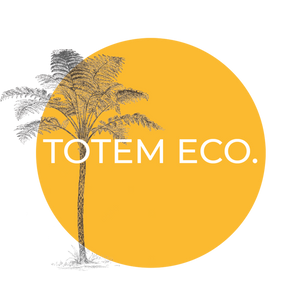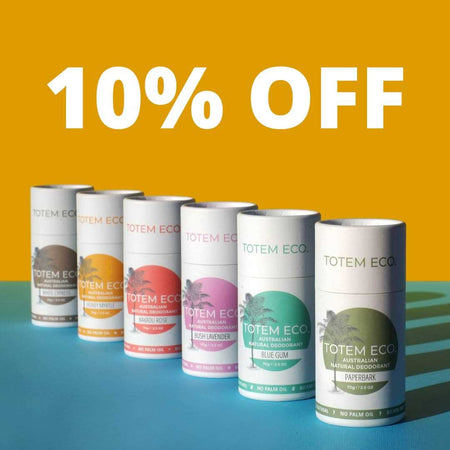Below are some common questions about our products.
If you have other questions, please get in touch at info@totemeco.com.au.
FAQs
No. One of our top priorities at Totem Eco is to do our best to cater for Every Body. Sodium Bicarbonate is known to cause skin irritation and darkening of the skin under the armpits for some consumers. It is believed that prolonged exposure to sodium bicarbonate can alter the pH balance of your skin and as a result, your skin may begin to darken.
It was important that we formulate deodorants for all skin types and we believe our "bicarb free" natural deodorants pastes are even more effective at neutralizing body odor while being gentle and nourishing for your body.
Unlike baking soda (also called sodium bicarbonate or NaHCO3) found in other natural deodorants, Magnesium Hydroxide (a natural mineral salt) has not been found to cause skin irritation, dryness or discoloration. Magnesium hydroxide has a greater, more stable and prolonged buffering capacity than sodium bicarbonate to balance the body’s natural pH and kill odour-causing bacteria without reducing skin moisture or causing skin damage.
If you’ve tried a baking soda deodorant or have had a rash from baking soda before, our magnesium-based deodorants are probably best for you!
Absolutely not. We created Totem Eco. with the desire to only make products that we would wish to use on ourselves and improve the well being of others. It's for this reason, that all our products are made wiith safe, nourishing and all-natural ingredients.
Yes. At Totem Eco, we cater for everyone. You may find that a number of other natural deodorant pastes use beeswax. Our natural deodorants contain Candelilla wax, derived from the leaves of the Candelilla shrub, Euphorbia antisyphilitica.
Yes. We believe that by changing our habits and making conscious and informed decisions about the products we use, we can all make a difference. That’s why, at Totem Eco, we strive to use only sustainable, locally sourced and Australian grown and made ingredients for all our natural products.
We certainly don’t use palm oil. We only use clean, natural, non-toxic ingredients. We harvest rainwater for formulating our products and our facility operates on solar power.
It’s a Way Of Life! :)
Yes. Our Manuka and Honey Myrtle Essential Oils are plantation-grown. Harvesting involves cutting the terminal branches and leaves of the plants to just above ground level. Following harvest, the plants will coppice (re-grow with stimulated growth), ready to be harvested again, usually around 12 months later. The plants are not pulled from the ground, and as such, it is not necessary to replant year on year. While our Kunzea Essential Oil is wild-harvested (from private land), the same harvesting practices are applied to ensure plant biodiversity is not threatened.
Commercial production of essential oils requires the sustainable management of any species; without regeneration, ongoing production is not possible. Producers must take responsibility for the regeneration of plants on Private Land and it is in their own best interest as the resources required to produce essential oils are significant. The industry does not target one-off sales. Producers will typically have invested a significant amount of time and resources into developing their operations – including R&D, access to plant material, distillation facilities and infrastructure, as well as the development of markets, in order to build a business. Without sustainable management, the business fails - so the interests of producers are aligned with plant protection.
Our tins are made out of 100% recyclable, food grade aluminium.
Just like all our products, it was important to us that our tins also contain "no nasties" and have been tested to comply with food grade safety standards.
We feel strongly about not using plastic and unlike other tins made with heavier tin or steel, aluminum is lightweight, which helps to reduce our carbon footprint and consumer freight costs when shipping our products.
And all our tins are hassle free - designed with screw top lids for ease of opening.
Palm oil is an edible vegetable oil that comes from the fruit of oil palm trees, the scientific name is Elaeis guineensis. It is found in close to 50% of the packaged products we find in supermarkets, everything from pizza, doughnuts and chocolate, to shampoo, toothpaste and deodorant - even some natural deodorants. To meet this demand, a huge industry has developed. Oil palms are grown in many tropical countries, although Indonesia is the largest producer in the world.
Problem is, almost all palm oil plantations come at the cost of rainforests as the vast majority of companies cut down rainforests to replace them with hectares upon hectares of monoculture oil palm plantations. This is accelerating climate change, forces people from their traditional lands and as pushing species like the Indonesian orangutans to the edge of extinction.
Yes, absolutely!
And remember, it’s important to look for a deodorant formulated with natural, non-toxic ingredients rather than buy a deodorant just because it’s marketed to kids. Read our blog to learn why all natural deodorant’s should not be considered equal and why it was important that we formulated a Totem Eco natural deodorant that was safe for the whole family.








